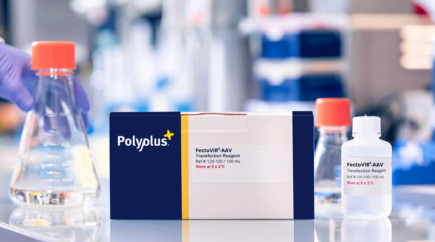Available at research and GMP grade to intensify production of recombinant AAV rAAV viral vectors at any scale from benchtop to 2000L scale bioreactor...

Meet our team at booth #561 during the BioProcess International Biotech week in Boston, MA on September 18th -21th 2023. Don't miss the opportunity to hear about our presentation on Scalable transfection process for AAV manufacturing: from DOE to successful 2000L scale-up and our poster on Development of a novel helper plasmid: one step closer to the next generation rAAV vectors.
 |
Daniel KOBACK , Bioprocess Application specialist at Polyplus®. |
 |
Hanna P. Lesch Ph.D., CTO of Exothera. |
Talk Summary : Recombinantly produced adeno-associated viruses (AAV) are the predominant viral vectors used for in vivo gene therapies owing to their relatively good safety, long term transgene expression, ability to infect a broad range of cells and ease in achieving high titers at small-scale. One of the main challenges in bringing AAV-based therapies to patients, is the ability to efficiently translate bench-scale processes to commercial GMP manufacturing while meeting the high dosage requirements. When developing a scalable transfection process, DOE (Design of Experiments) can be used to efficiently optimize key parameters. The next step is to scale-up the platform, which involves maintaining P/V (power per unit volume) across transfection container scales in order to create consistent complex growth for efficient and timely delivery of the complexes to your cells. As proof of concept, we partnered with Exothera and LogicBio® Therapeutics (Alexion) to develop a highly scalable AAV manufacturing platform with a capacity ranging up to 2000L.
Harnessing rAAVs as viral vectors for therapeutic transgene delivery still requires improvements in yields and specificity to lower vector doses, and therefore manufacturing cost, as well as to improve patient safety. To this end, our research is focused on developing novel technologies to ensure manufacturing of high yielding rAAV particles using transient transfection, as well as enhancing features of rAAV vectors that act on the overall size of packaged material and specificity of delivery. Here we present our state-of-the art approach to design new helper plasmids (phelpers) with the aim of improving both the infectiosity (TU/mL) and the quality (full/empty ratio) of the viral particle obtained from suspension cultures. We took the opportunity to exploit our proprietary DNA assembly method technology to explore the synergies of multiple genetic features modularly assembled in synthetic plasmids. Comparison of the biological activity of several versions of rationally designed pHelpers led us to identify the optimal configuration able to outperform existing helper plasmids in every tested bioproduction conditions. Our expertise in DNA plasmid design and assembly together with our scalable transfection solutions for rAAV manufacturing gives us the potential to improve both productivity and specificity of gene therapy products.